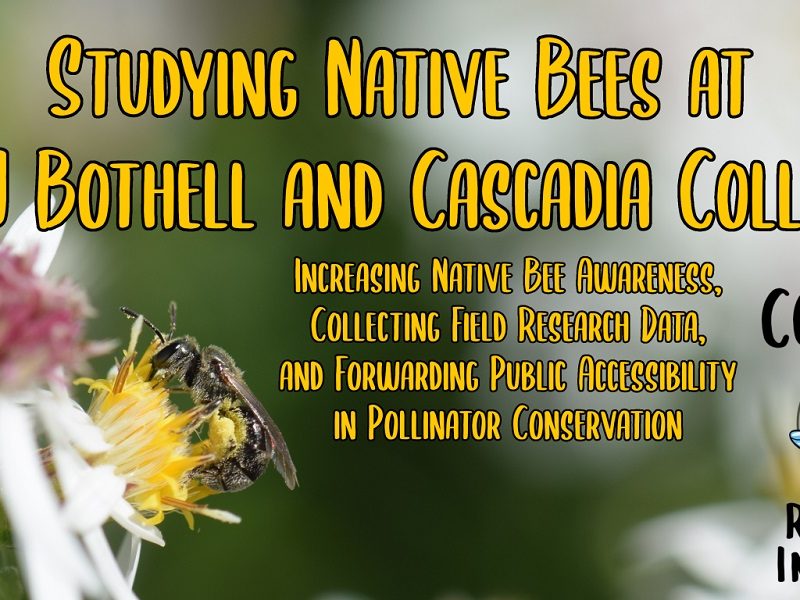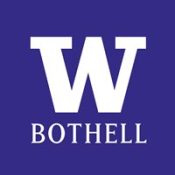CCUWBee Native Bee Research Initiative

Few of the 4000 native bee species in the United States are known to the general public, and most go unnoticed as pollinators. As natural spaces in urban areas decline, it becomes increasingly difficult for pollinator species to find available floral resources and nesting habitats. While pollinators rely on floral resources, 90% of all flowering plants also rely on pollinators to reproduce (Mader et al. 2011, Calderone 2012). There is a notable lack of data collected on bees and pollinator species, while simultaneously there has been a worldwide decline in bee species.
With the growing concern about the decline in pollinator populations, UW Bothell and Cascadia College made the joint decision to make the campus grounds more pollinator-friendly. The grounds team, with various educational and research projects, have planted and designed areas with attractive and native plants as resources for pollinators and promoted nesting sites by letting some areas grow unencumbered by mowing techniques and maintenance. From this decision, a joint venture to research pollination on campus was created, to record data regarding the abundance and diversity of bee populations on campus. The goals of CCUWBee are to create opportunities for students to engage in citizen science research on bee species, make the data available to students and research bodies, and engage the public and campus community on the value of the conservation of bees and other pollinators. CCUWBee also aims to evaluate and advise the campus’ current efforts to conserve pollinators and their habitat.
Student Outcomes: Students participating in research projects will gain a better understanding of pollinator and native bee ecology and conservation, as well as gain experience in the scientific method and the development of research methodology.
Requirements: There are no formal qualifications to join CCUWBee other than an enthusiasm for learning about native bees. This research project is open to both UWB and Cascadia students.
Students must be aware and accepting that learning to identify bees takes time and patience- none of us are experts! While not required, students interested in CCUWBee should consider taking BIS 360 Pollinator Diversity and Conservation with Dr. Amy Lambert in the Spring quarter. Students who take this course have a *major* advantage when learning to identify bees and participate in research studies.
The primary research project being undertaken explores the interactions between plant families and bees found on campus. The diversity surveys focus on a predefined area and record Unique Species Interactions (USI). USI documents a unique bee species visiting a unique floral species and will document a USI even if the same individual bee visits another unique floral resource.
Photo data is collected during surveys and aggregated later into a digital archive. (Requires identification skills to differentiate between bee/fly/wasp – all training provided)
Other opportunities include, but are not limited to:
- Grant writing experience to seek funding for the group
- Managing CCUWBee social media presence
- Planning/executing native bee events on and off campus
- Creating media such as videos or podcasts featuring CCUWBee
- Educating students and members of the public about native bees
Time Commitment: Research runs through Spring and Summer quarters, as well as September. There are Autumn and Winter opportunities as well, but no fieldwork is done during these quarters.
Citations:
- Mader, E., Shepherd, M., Vaughan, M., Black, S., & Lebuhn, G. 2011. Attracting Native Pollinators: Protecting North America’s Bees and Butterflies. Storey Publishing.
- Calderone, N. W. 2012. Insect Pollinated Crops, Insect Pollinators, and US Agriculture: Trend Analysis of Aggregate Data for the Period 1992-2009. PLoS. [accessed 2020 January 29]; 7(5):1-27. https://journals.plos.org/plosone/article/file?type=printable&id=10.1371/journal.pone.0037235
